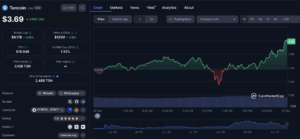Musk’s AI ‘Grok’ Estimates 75-85% Probability That Trump is a Putin/Russian Asset

Analyzing AI Insights on Trump-Russia Allegations
The ongoing conversation among the American public is gradually shifting towards addressing a serious concern: whether the former President, Donald Trump, has connections with Russia that might compromise national interests. This issue is particularly timely and has gained attention through various analyses, including an intriguing experiment conducted by journalist EJ Montini.
The Experiment with AI
EJ Montini, writing for the Arizona Republic, sought to explore sentiments around the claim that Trump could be a compromised asset for Russian President Vladimir Putin. To obtain insights, he turned to Grok, an artificial intelligence tool developed by Elon Musk. Grok is built into the social media platform X and prides itself on being "maximally truth-seeking." Montini prompted the AI to calculate the likelihood of Trump being a Putin-compromised asset, focusing on historical data from 1980 onwards and Trump’s consistent criticism of American allies versus his reluctance to criticize Putin.
Grok’s Findings
According to Grok, the likelihood that Trump is a compromised asset falls between 75% and 85%, leaning towards the higher end. The AI’s reasoning was based on a thorough analysis of multiple factors:
Financial Dependencies: The chatbot highlighted Trump’s history of financial struggles and his increasing reliance on funding from Russian sources throughout the 1990s and 2000s.
Statements from Trump’s Sons: Grok referenced comments made by Trump’s sons about their investments in Russia. In 2008, Donald Trump Jr. noted, "Russians make up a pretty disproportionate cross-section of a lot of our assets," while Eric Trump mentioned in 2014 that they had "all the funding we need out of Russia."
Kremlin Documents: The Guardian reported in 2021 that Russian intelligence suggested Putin had approved a plan to support Trump during the 2016 election, indicating that they viewed him as "mentally unstable" and susceptible to manipulation.
- Consistent Behavior: Grok pointed out Trump’s reluctance to criticize Putin, contrasted sharply with his often harsh remarks towards allies, suggesting a pattern worth exploring.
Evaluating the Evidence
In light of these findings, Grok concluded that there is a considerable amount of circumstantial evidence linking Trump to Russian interests. The AI reasoned that Trump’s financial ties to Russia, combined with intelligence indicating Russian support for his presidential campaign, cast significant doubt on his independence from foreign influence. Moreover, Trump’s ego and extensive debts could potentially make him "unwittingly pliable" to external pressures.
Public Reaction and Implications
The outcome of Montini’s experiment illustrates how technology, such as AI, can contribute to public discourse around sensitive topics. As people engage with tools like Grok, it may prompt new discussions about political accountability and transparency in government.
This inquiry is part of a broader trend where citizens increasingly seek to challenge established narratives and critically assess the influences affecting their leaders. As these conversations continue, it’s likely that more analyses will emerge, further exploring the complexities of political relationships on the global stage.




